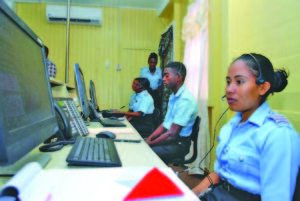
– lagging behind Jamaica, other countries in effective investigations
The Inter-American Development Bank’s (IDB’s) recently released report — ‘Smart Spending on Citizen Security, Beyond Crime and Punishment’ — is warning that the latest statistics on Guyana’s crime fighting show that the Guyana Police Force has a below-average capacity to speedily tackle crime.
Last year, a state-of-the-art 911 emergency system was commissioned as part of the reform of the security sector
This IDB report compares the various security capacities of different countries in the region. In statistics that detail countries’ capacity to apprehend suspects and process and sanction without undue delay, Guyana’s 32 per cent capacity to effectively investigate and 42 per cent capacity to speedily prosecute is ranked behind Suriname, Barbados, Grenada, Antigua and Barbuda, the Bahamas, Saint Lucia, and Saint Kitts and Nevis as at 2017. The statistics particularly show that the aforementioned countries, including Jamaica, carry out more effective investigations than Guyana does.
However, Guyana ranks better than several countries, including Venezuela, Bolivia, the Honduras, Guatemala, El Salvador, Colombia, Mexico and Peru.
While the report’s statistics show that Trinidad and Tobago, Brazil and Panama are marginally better than Guyana at investigating crime, Guyana is better rated when it comes to the judicial aspect of dealing with criminals.
“High levels of (crime) are related to the low capacity to apprehend and prosecute offenders (effective investigation), as well as to judge and sanction the accused (effective adjudication). The average of both for the region is a startlingly low 38 per cent, compared to the United States (74 per cent) or Spain (70 per cent). Again, this measure varies widely in the region,” the report notes.
The Guyana Police Force (GPF) had disclosed in June of this year that while serious crime statistics were showing reductions, there had been an increase in robbery under arms and rape cases compared to last year’s corresponding period.
The statistics from January to May month-end show a seven per cent increase in robbery under arms, an eight per cent increase in robberies where no instruments were used, and a four per cent increase in rape cases. Robberies were up by three per cent.
According to the GPF, serious crimes have decreased by seven per cent, and there was a 23 per cent decrease in murder, with a total of 36 murders recorded in 2018. Of these murders, 17 stemmed from disorderly circumstances, nine resulted from domestic causes, seven were robbery-related, and three were labelled as unknown.
In addition, there was a 28 per cent decrease in robbery under arms wherein an instrument other than a firearm was used, a 34 per cent decrease in larceny, and a three per cent increase in burglary.
The Police also recorded a total of 55 firearms being taken off the streets so far for this year, as compared to 64 for the corresponding period last year. Most of the guns seized were pistols – 33 in total. Most of them – 27 – were reportedly confiscated by ‘A’ Division (Georgetown-East Bank Demerara) ranks.
Government has been vocal on the need to reform Guyana’s security agencies, and under the Citizen Security Strengthening Programme (CSSP), has been making efforts to effect changes.
There has been talk of plans to construct a command centre and victim-friendly police stations. And there have been initiatives like the commissioning of a state-of-the-art 911 emergency call system at Brickdam last year.
In January, British Security Expert Colonel Russel Combe had handed over to President David Granger a number of recommendations for security reform, with special focus on reforms within the Guyana Police Force. But the report has since never been released to the public.



